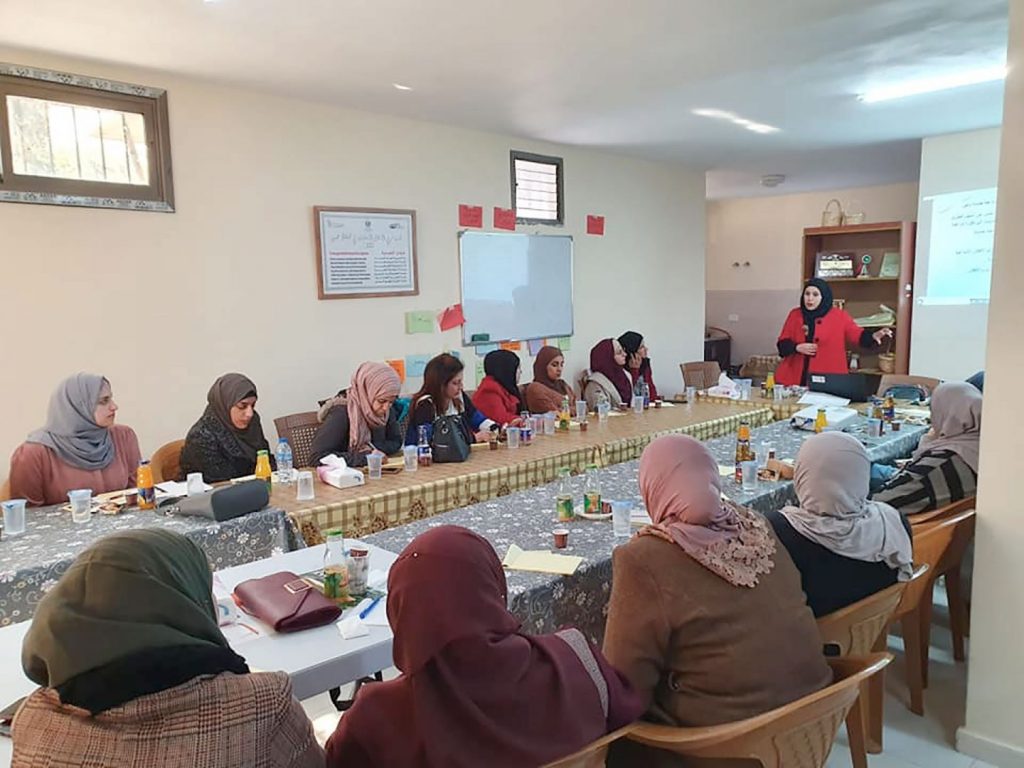Focusing on women’s needs and skills
There are differentiated impacts of energy scarcity on women, and women’s participation in the renewable energy sector as a whole – in Palestine and elsewhere – is neither visible nor supported, with women remaining underrepresented in decision-making bodies and processes. PENGON’s ‘Empowering Women as Sustainable Energy Leaders’ initiative was set up to support women’s participation and leadership in the context of low social acceptance and little state support for women taking on such roles.
The project aims to build on the capacity and learnings from previous energy scarcity projects in the region and to further support women’s participation and leadership. From a gender justice perspective, the evolution of clean energy projects in the region, from a service-providing initiative to one which places women’s participation and protagonism at the center, is one key result.
Clean energy and lower bills
Through the initiatives, which target low-income families and small businesses, electricity bills have hit zero thanks to the use of clean energy sources. PENGON-FOE has provided technical capacity-building to train women to operate and maintain clean-energy technology, such as solar powered devices and water pumps in households, farms and training centres. This is alongside building women’s skills to run lobbying and advocacy campaigns to influence national clean energy polices.
PENGON and the initiative’s members have brought people-powered electricity to more than 270 households in the Gaza Strip. In the past, these communities struggled to access enough energy to meet their needs, and the limited amount they were getting came from dirty energy sources in Israel, such as coal. PENGON is also moving towards changing the law to protect the environment by increasing the share of Palestinian energy that comes from clean energy sources.
PENGON organised women-only discussion spaces throughout 2018 to 2020, which enabled women to participate freely in discussions on energy issues. Community workshops were held to discuss the importance of women’s participation and strengthen social acceptance of the project. In the Gaza Strip, PENGON’s work helps women build their skills at community and organisational level, and to become active in lobbying and advocacy spaces for influencing energy policies, thereby benefitting more than 800,000 citizens.
Lobbying for clean energy across Palestine
PENGON coordinates efforts to resist and highlight Israel’s control over natural resources and violations against the environment in Palestine. This means coordinating a group of 16 Palestinian environmental NGOs. In recent years this has included lobbying and advocating for clean energy, building the capacity of Palestinian environmental groups and visiting communities affected by energy scarcity.
Many of PENGON’s activities were designed to target the Ministry of Women’s Affairs and the Ministry of Energy and Natural resources, as governmental ministries are considered a key stakeholder of the project. One example is training ministries in how to apply gender mainstreaming in their work. As a result, in 2020 the Ministry of Women’s Affairs took an active part in building the capacity of the gender unit in the Energy Authority and ensuring that the national clean energy strategy is sensitive to women’s needs.
In addition, PENGON hired a consultant to carry out a legal review of energy laws, regulations and policies from a gender perspective, and make recommendations for the Palestinian authorities on how to practise this perspective. This has been used as a lobby tool towards the government.
PENGON has also mobilised women’s groups to take part in Friends of the Earth International’s Global Week of Action for Climate Justice, in cooperation with the Ministry of Women’s Affairs. Slogans and political messages were inspired by the demands of the materials produced during the project. The action included a lobbying activity, with prioritisation of women’s participation.
Impact of the Covid-19 outbreak impact
All Palestinian cities were placed under lockdown for three months after the outbreak of COVID-19, resulting in delays to implement solar energy projects. However, PENGON-FOE started working again in these cities with some protective measures directly after the government opened them up. While the spread of COVID-19 has slowed progress in the lobbying work, one positive outcome is that when many activities moved online this enabled more stakeholders to be involved.
“The Empowering Women as Sustainable Energy Leaders project raised the social acceptance of women particularly in decision making in the clean energy sector as well as raised their economic power. This project has further reinforced the centrality of women movements in the quest for clean energy and environmental sustainability.”
– Akinbode Matthew Oluwafemi
This story originally featured in the Atlas of Utopias. An in-depth article about PENGON-FOE can be read on Open Democracy.
